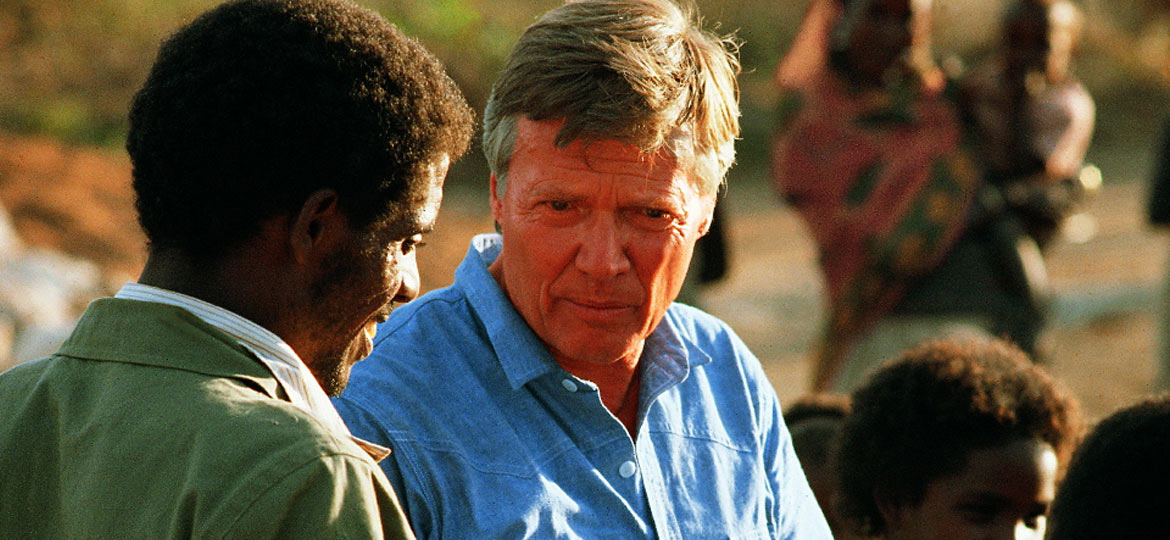
The founder of Menschen für Menschen
Karlheinz-Böhm
“There is no first, second or third world. We all live on one and the same planet, for which we are jointly responsible.”
– Karlheinz Böhm
For 40 years, Menschen für Menschen has stood for the basic values of humanity and global solidarity. In this way, we follow Karlheinz Böhm’s conviction that every person counts and can contribute to changing the world for the better – as a person for people.
As a person
From the anger of the individual...
“Anger is the main driver of my work – anger about the injustice between rich and poor,” as Karlheinz Böhm always described his motivation. It was also this anger that moved him 40 years ago to bet in the family show “Wetten, dass..?” “that not even one in three viewers donates one mark, one franc or seven schillings for people in the Sahel.” Karlheinz Böhm was proved right and won the bet. Nevertheless, around 8.4 million schillings (over 600,000 euros) were raised and formed the foundation of the organization.
In October 1981, Karlheinz Böhm traveled to Ethiopia, where, near Babile in the east of the country, he met around 1,500 semi-nomads of the Hauiwa tribe, who led a bleak life in a famine camp without any prospects for their future.
Karlheinz Böhm met the people as equals and listened to them, and asked about what they needed most urgently. Barely two years later, it was done: the farmers were able to bring in the first truly profitable harvests and the famine camp at Babile was closed forever.
In October 1981, Karlheinz Böhm traveled to Ethiopia, where, near Babile in the east of the country, he met around 1,500 semi-nomads of the Hauiwa tribe, who led a bleak life in a famine camp without any prospects for their future.
Karlheinz Böhm met the people as equals and listened to them, and asked about what they needed most urgently. Barely two years later, it was done: the farmers were able to bring in the first truly profitable harvests and the famine camp at Babile was closed forever.
For people
...to help for millions of people
By helping the people in the Erer Valley, Karlheinz Böhm laid the foundations for his “long-term capacity building”. His wife, Almaz Böhm, whom he met and fell in love with in 1987, has stood by his side for many years. Over 30 years later, over 6 million people benefit from long-term projects that aim at enabling the farmers to advance their own development themselves and hence that of the entire region. There are currently 28 project regions in Ethiopia covering an area of 60,000 km² (about two-thirds the size of Austria), of which 16 have already been handed over in their entirety to the responsibility of the population. A wish of Karlheinz Böhm has thus partially been fulfilled: “To one day no longer be needed.”
1928
1955
1960
1981/05
1981/10
1981/11
1983
1984
1985/01
1985
1987
1997
2003
2014
1928
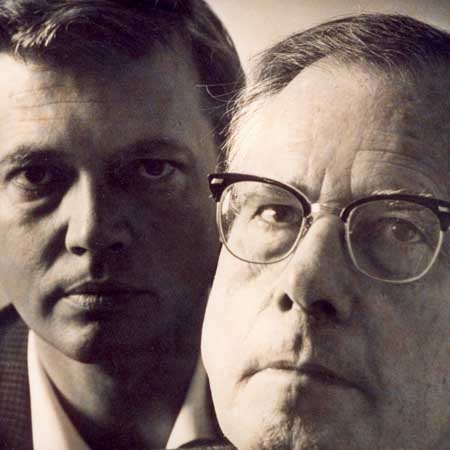
Childhood and youth
Karlheinz Böhm was born in Darmstadt, on 16 March 1928, as the only son of famous conductor Karl Böhm and soprano singer Thea Linhard.
His father and mother were both traveling a lot and lived for their art. The stage was their home, a home that Karlheinz Böhm was lacking for a long time. When he was a kid, his grandmother would take care of him mostly. He escaped the horrors of World War II through a boarding school in Switzerland, where he lived months without contact with his parents.
In his youth Böhm took piano lessons and wanted to become a pianist - in part to establish a connection with his parents through music. But while trying out he didn't show enough promise. Another vital connection to his overpowering father was lost.
His father and mother were both traveling a lot and lived for their art. The stage was their home, a home that Karlheinz Böhm was lacking for a long time. When he was a kid, his grandmother would take care of him mostly. He escaped the horrors of World War II through a boarding school in Switzerland, where he lived months without contact with his parents.
In his youth Böhm took piano lessons and wanted to become a pianist - in part to establish a connection with his parents through music. But while trying out he didn't show enough promise. Another vital connection to his overpowering father was lost.
1955
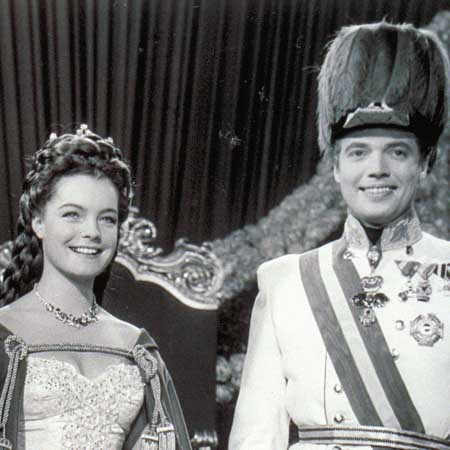
The world as a stage
Soon, he fell in love with the stage: in 1948 he had his first, brief role as a theater actor at Vienna’s legendary Burgtheater. This was followed by several years at the Theater in der Josefstadt in Vienna.
Between 1955 and 1957 Karlheinz Böhm won international fame with his role as Emperor Franz Joseph alongside Romy Schneider in the “Sissi” trilogy.
Between 1955 and 1957 Karlheinz Böhm won international fame with his role as Emperor Franz Joseph alongside Romy Schneider in the “Sissi” trilogy.
1960
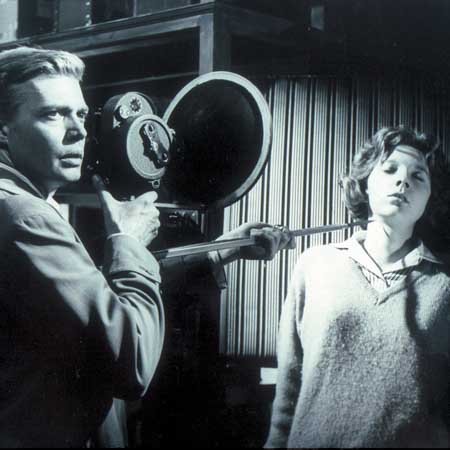
New facets
In 1960 he set a counterpoint to the image as Sissi emperor in Michael Powell’s psychodrama “Peeping Tom”. Karlheinz Böhm appeared in a total of 45 motion pictures spanning three decades, including four film productions by Rainer Werner Fassbinder.
1981/05
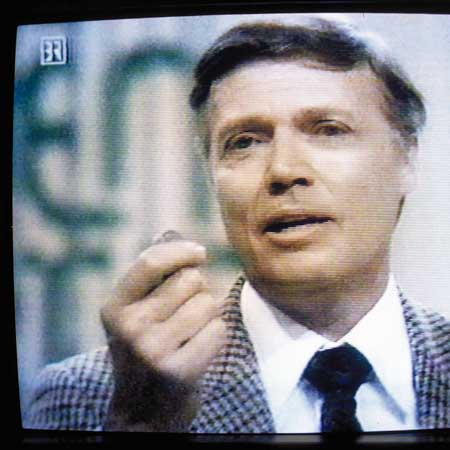
A wager that changed everything
On 16 May 1981, shocked by a devastating famine, Karlheinz Böhm made a bet in the German family programme “Wetten, dass…?” that not “every third viewer will donate one Deutschmark, one Swiss franc or seven Austrian Schilling for people in the Sahel region”.
1981/10
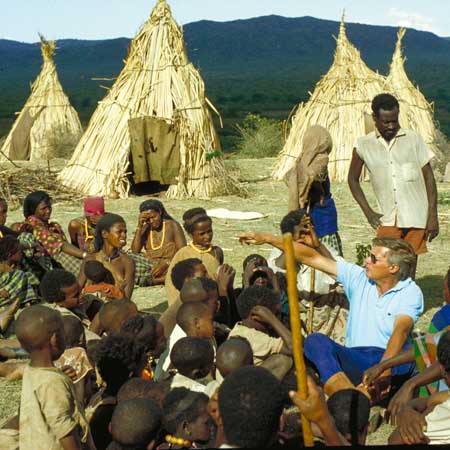
The founding of Menschen für Menschen
Karlheinz Böhm wins the bet, but the equivalent of 8,4 million Austrian Schilling (approx. 610,452 Euro) are raised. In October, he flies to Ethiopia for the first time and visits a refugee camp in Babile. He decides to help himself.
1981/11
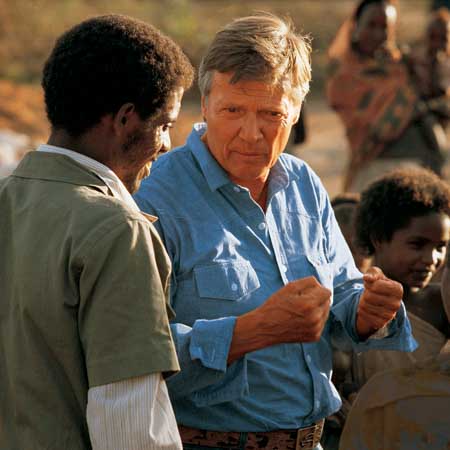
Help for self-help
Shortly thereafter, on 13 November, he founds the aid organisation Menschen für Menschen and so lays the foundation for “help for self-help” for millions of people in Ethiopia.
Immediately after its foundation Menschen für Menschen starts to settle 2,100 refugees, who waste away in a hunger camp, in the Erer Valley. Only wwo years later the families yield their first crops and the hunger camp is closed.
Immediately after its foundation Menschen für Menschen starts to settle 2,100 refugees, who waste away in a hunger camp, in the Erer Valley. Only wwo years later the families yield their first crops and the hunger camp is closed.
1983
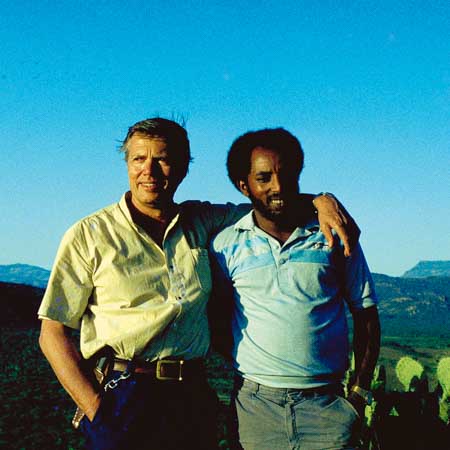
Language of the heart
Karlheinz Böhm brings in local helpers. Berhanu Negussie accompanies him since the early years. First as interpreter to enter into a conversation with people; today Berhanu is the organisation’s country representative in Ethiopia.
1984
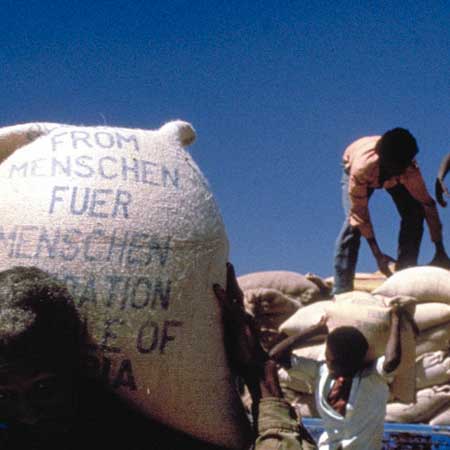
Catastrophic droughts
Following the early success, Karlheinz Böhm does not stop helping. During one of the largest catastrophic droughts in Ethiopia in 1984, Menschen für Menschen saved hundreds of thousands from famine.
1985/01
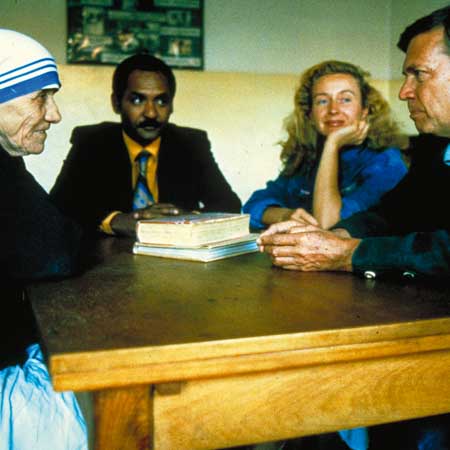
‘Let’s not talk but help.’ - Meeting Mother Theresa
Karlheinz Böhm, 1985: “In Ethiopia I met Mother Teresa with the people suffering from hunger. She said: ‘Let’s not talk but help.’ She was right.”
1985
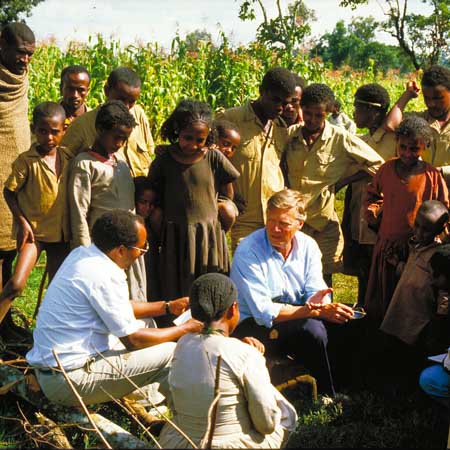
The work continues
1985 – Menschen für Menschen supports 85,000 people who were resettled from the arid regions in the north to Illubabor (west Ethiopia) by the Ethiopian government.
1987
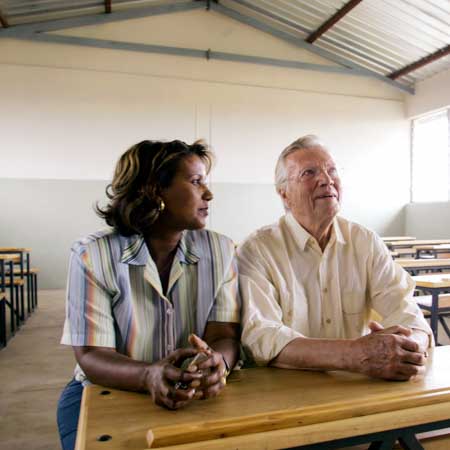
True love
In May 1987 Karlheinz Böhm gets to know and love Almaz. After completion of a course of study at the Agricultural College in Awassa, she started working for Menschen für Menschen as department head for livestock breeding in the project area Erer in early 1986.
On 16 November 1991 Almaz and Karlheinz Böhm get married in Graz, Austria. For many years Almaz Böhm is her husband’s closest adviser, and works by his side for the improvement of her compatriots’ living conditions.
On 16 November 1991 Almaz and Karlheinz Böhm get married in Graz, Austria. For many years Almaz Böhm is her husband’s closest adviser, and works by his side for the improvement of her compatriots’ living conditions.
1997
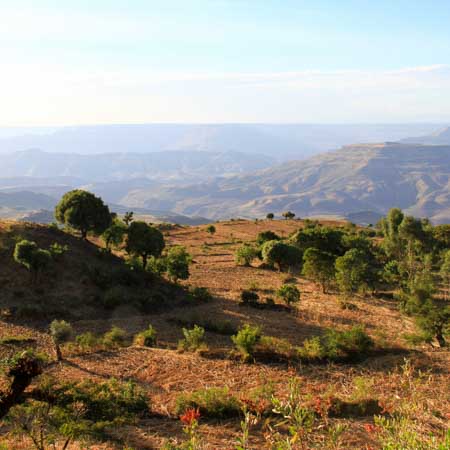
Derra - A Success Story
1997 – Derra – the first Austrian project region: the region Derra encompasses 1,500 km². It is the first project region entirely financed by Austrian donations and is completed in 2010.
2003
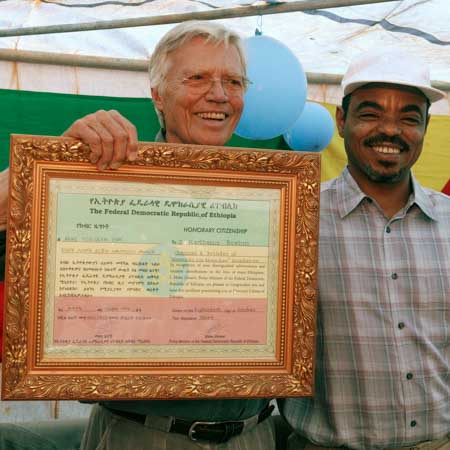
Honorary citizen
With the Alem Katema Enat hospital the third large hospital built by Menschen für Menschen opens in 2003. During the opening ceremony, Ethiopian head of state Meles Zenawi awards Karlheinz Böhm the honorary Ethiopian citizenship.
2014
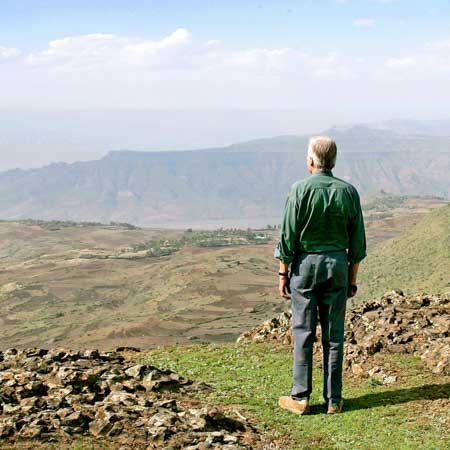
Saying goodbye to Karlheinz Böhm
Karlheinz Böhm’s dream had always been: „How nice it would be if one day the people came to me and said: ‘thank you, Karl. We have achieved a lot together but now we don’t need you anymore.”
In 16 of 28 project regions Karlheinz Böhm’s dream has come true: they were completed and transferred to the responsibility of the population.
Karlheinz Böhm, founder of the organization Menschen für Menschen died on Thursday, 29 May 2014, aged 86. We salute this remarkable man.
Thank you very much for a unique life’s work that we as Menschen für Menschen will continue until your dream has come true and one day we will indeed not be needed anymore.
In 16 of 28 project regions Karlheinz Böhm’s dream has come true: they were completed and transferred to the responsibility of the population.
Karlheinz Böhm, founder of the organization Menschen für Menschen died on Thursday, 29 May 2014, aged 86. We salute this remarkable man.
Thank you very much for a unique life’s work that we as Menschen für Menschen will continue until your dream has come true and one day we will indeed not be needed anymore.
Thank you!
Dear Karl, many thanks for your life’s work as a person for people!
Listening to and collaborating with the population in all our projects has remained an important principle of our work. The population in our project areas lovingly calls us “people”. Karlheinz Böhm laid the foundations for this. Today, Menschen für Menschen is a recognized and high appreciated aid organization in Ethiopia. Thank you Karl for your humanity!